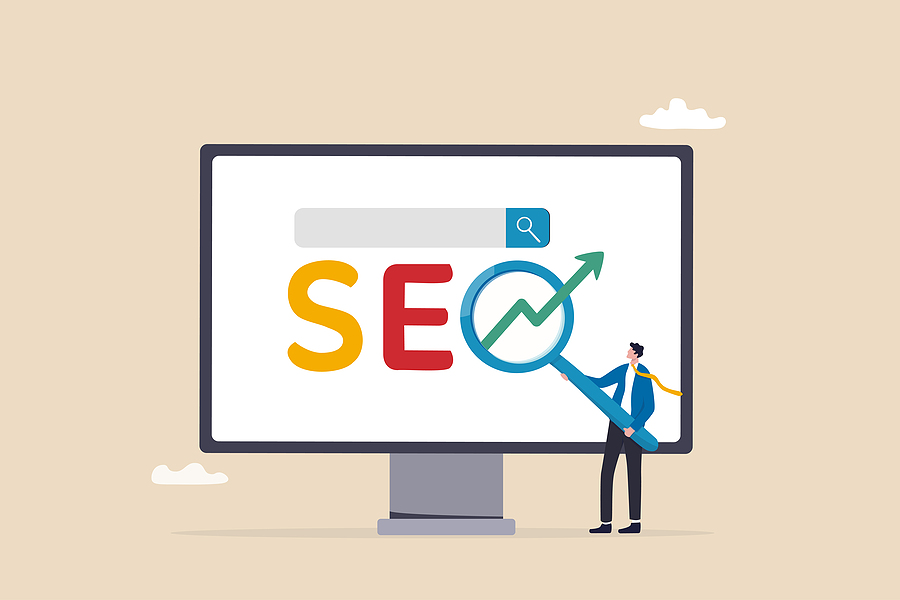Want a Website That Gets Results? Track These Key SEO Metrics
Part 2 of our Key Metrics Series Search Engine Optimization, or SEO, is a huge part of a successful website…so much so, that it deserves its own...
5 min read
 Jamie Beebe
:
September 7, 2023
Jamie Beebe
:
September 7, 2023

Search Engine Optimization (SEO) is a crucial part of your digital marketing strategy.
Read that again: SEO is a crucial part of your digital marketing strategy.
If that’s true (and it is 😉), then SEO should be high on the priority list for your business. But if you’re like many companies, it probably isn’t.
The reality is, because the work you put into SEO doesn’t provide immediate results, it can be easy to dismiss the effect it has on your online visibility. But if you hope to reach your target audience online, investing in SEO is non-negotiable.
After all, why even have a website (or any digital marketing content) if it’s just going to get lost among the millions of other websites out there?
Even though there are other ways to generate traffic to your website (social media, paid Google ads, guest blogging, etc.), the vast majority of online traffic comes from search engines like Google. So if your content isn’t optimized for those search engines, it’s going to be pretty tough for people to find you online.
But online visibility is only one of the benefits of good SEO. If you’ve been wondering (or if the higher-ups at work have been asking), “Why do I need SEO?” you’ve come to the right place. Read on to learn more about what exactly SEO is and why it’s such a vital part of an effective digital marketing strategy.
MOZ describes SEO as “the practice of increasing both the quality and quantity of website traffic, as well as exposure to your brand, through non-paid (also known as ‘organic’) search engine results.”
MOZ goes on to explain that the heart of SEO is understanding what people are searching for, including the answers they’re seeking, the words they’re using when they search, and the type of content they’re looking for.
The goal is to drive more traffic to your website by improving its ranking in Search Engine Results Pages (SERPs).
SEO is a long-term strategy — it involves utilizing a number of practices to improve the quality of your website consistently over time. In the old fable of the tortoise and the hare, SEO is definitely the tortoise: it’s slow and steady work, but, in the end, it wins the race.

There are three main types of SEO: on-page, off-page, and technical. And they’re all important for your digital marketing strategy. Here’s a quick overview of each type:
And that, in a nutshell, is what managing your website’s SEO looks like. Next, let’s take a look at the ways that good SEO can benefit your digital marketing strategy.
-4.gif?width=480&height=339&name=giphy%20(2)-4.gif)
How Do I Track the Effectiveness of My SEO Efforts?
Since SEO is a long-term strategy with few immediate results, how do you know if your efforts have been successful? Check out our blog on Key SEO Metrics To Track to learn how to track the effectiveness of your SEO work.
Good SEO brings more visitors to your website, improving your brand awareness and encouraging more prospects to connect with you. More visibility online = more eyes on your website and more people who know who you are, what you do, and where to find you when they need you.
-4.gif?width=500&height=281&name=giphy%20(3)-4.gif)
SEO helps improve your website’s search engine rankings by optimizing your site’s content and technical aspects, as well as connecting you to other reputable websites that boost your image. The higher you rank, the more visibility and traffic your site will have (which can translate into more leads and sales!).
When people search for something online, they rarely scroll past the first few results on the SERP. In most cases, they’ll only click on the first 3-5 results listed. In fact, the #1 result is 10 times more likely to get a click compared to the #10 result!
And because the goal of Google and other search engines is to serve their users helpful, high-quality content, they prioritize websites that meet that criteria. SEO tactics help you ensure your web pages have what Google is looking for.
-2.gif?width=385&height=385&name=giphy%20(4)-2.gif)
The higher your web pages rank on SERPs, the more trustworthy your business appears to both your target audience and the web crawlers that “read” your content. And the only way to get that number one spot in organic search is to make sure your web pages have excellent SEO.
Earlier, we mentioned backlinks as a way to build authority online. Building relationships with well-known names in your industry via backlinks helps give your website and business more credibility, which leads to more clicks and more potential business.
Another way that SEO benefits your business is by improving your website’s user experience. By optimizing your website’s structure, content, and navigation, and ensuring your site is accessible, you build a better experience for your website visitors.
A better user experience helps reduce bounce rates, increase user engagement, and improve conversions.
One big element of user experience is mobile responsiveness. Because more people surf the web on their smartphones than on computers these days, mobile friendliness is vital. If someone has a bad experience on their mobile device (your site doesn’t fit in the page, loads slowly, buttons and links are hard to tap, etc), they’ll be pretty likely to bounce and visit a competitor’s site.
On the other hand, if your site is mobile-friendly, users will be more apt to stick around and explore the content on your website.
-4.gif?width=400&height=400&name=giphy%20(5)-4.gif)
While SEO work is a slow and steady process, it ultimately delivers pretty impressive ROI. And unlike paid search advertising, which only brings results while you’re paying for it, organic SEO results continue to improve over the long haul.
Because SEO targets specific audiences based on the search terms they’re using, it attracts more qualified leads to your website. Since your website visitors are already looking for the product or service you offer, they’re primed to buy, improving your chances of making a sale.
When done well, SEO gives you an advantage over the competition, with better website performance, more relevant content, and higher SERP rankings…which lead to more traffic and, ultimately, more chances to convert prospects and grow your bottom line.
-2.gif?width=415&height=260&name=giphy%20(6)-2.gif)
We hope this blog gives you a better understanding of how SEO can benefit your business. If you’d like to learn more about the ways SEO can boost your digital marketing strategy, the team at Wild Fig would love to help! Click below to schedule a free exploratory call to discuss our SEO services. We can’t wait to work with you!


Part 2 of our Key Metrics Series Search Engine Optimization, or SEO, is a huge part of a successful website…so much so, that it deserves its own...
![How Often Should I Refresh the Content on My Website? [And Why Is It Important?]](https://www.wildfigmarketing.com/hubfs/bigstock-Technical-Support-Programming-460826949.jpg)
If it's been a while since you made updates to your website...it might be time.

Part 3 of a 3-part series on SEO basics